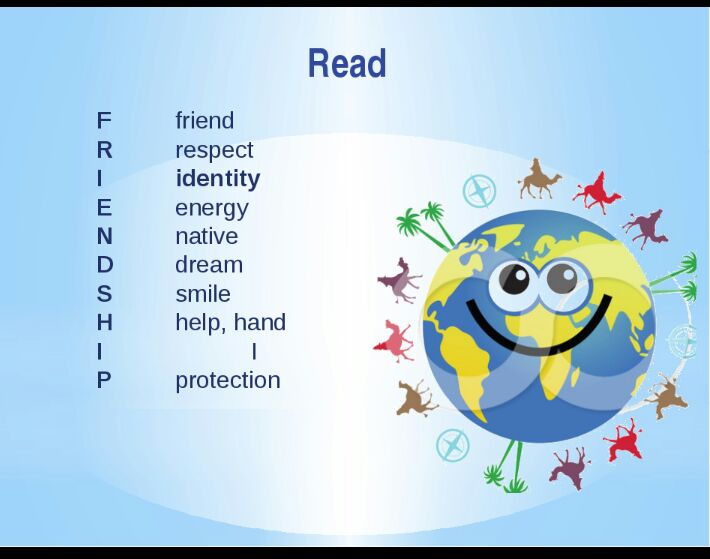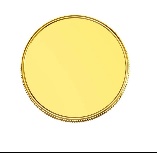
Lesson plan
жүктеу мүмкіндігіне ие боласыз
Бұл материал сайт қолданушысы жариялаған. Материалдың ішінде жазылған барлық ақпаратқа жауапкершілікті жариялаған қолданушы жауап береді. Ұстаз тілегі тек ақпаратты таратуға қолдау көрсетеді. Егер материал сіздің авторлық құқығыңызды бұзған болса немесе басқа да себептермен сайттан өшіру керек деп ойласаңыз осында жазыңыз
Ашық сабақ "Friendship"7сынып
Ашық сабақ "Friendship"7сынып
Lesson plan
|
Unit: 3. Values |
School: S. Kozhanov |
|||||||||||||||||||||||||||||||||||||
|
Date: |
Teacher name: Aisulu Zhakipova |
|||||||||||||||||||||||||||||||||||||
|
CLASS: 5 |
Number present: |
absent: |
||||||||||||||||||||||||||||||||||||
|
Lesson title |
Friendship |
|||||||||||||||||||||||||||||||||||||
|
Learning objectives(s) that this lesson is contributing to (link to the Subject programme) |
5.L6 deduce meaning from context in short, supported talk on an increasing range of general and curricular topics 5.S7 use appropriate subject-specific vocabulary and syntax to talk about a limited range of general topics 5.UE6 use basic personal and demonstrative pronouns and quantitative pronouns some, any, something, nothing anything on a limited range of familiar general and curricular topics |
|||||||||||||||||||||||||||||||||||||
|
Lesson objectives |
All learners will be able to: - Identify the meaning of short text and apply appropriate subject – specific vocabulary with support. More learners will be able to: - Express their ideas and thoughts using subject – specific vocabulary according to the theme ‘‘Friendship’’ with some support. Some learners will be able to: - Make up sentences including quantitative pronouns some, any according to title ‘‘Friendship’’ - Recognize the quantitative pronouns some, any according to the topic ‘‘Friendship’’ without support |
|||||||||||||||||||||||||||||||||||||
|
Assessment criteria |
- Apply topic related vocabulary in speech appropriately arranging word. - Differentiate between personal and demonstrative pronouns and quantitative pronouns some, any, something, nothing, anything - Figure out the content of short conversation with some support. |
|||||||||||||||||||||||||||||||||||||
|
Values links |
The 3rd value of “Mangilik Yel” National unity, peace and harmony in our society |
|||||||||||||||||||||||||||||||||||||
|
Cross-curricular links |
Kazakh language |
|||||||||||||||||||||||||||||||||||||
|
Previous learning |
Family relationship |
|||||||||||||||||||||||||||||||||||||
|
Plan |
||||||||||||||||||||||||||||||||||||||
|
Planned timings |
Planned activities (replace the notes below with your planned activities) |
Resources |
||||||||||||||||||||||||||||||||||||
|
Start 3 – min 5 – min 2 - min |
Organization moment: Good morning, children’s. I`m so glad to see you. Stand a circle and wish their best wishes to each other. «Heart by heart» Model: - I wish you luck! -I wish you Success! -Be boldness!
Dividing into subgroups: Teacher divides learners into subgroups using colored stickers. 1.Friendship 2.Peace Introduction of the theme: Today we are going to read to speak and write about our best friends and friendship. Task - 1 Checking up homework using the method «a Mirror». Students look at the mirror and describe about yourself.
My name is ------------------ I am --------- years old. I have ---------- family members. I have ------ brothers ------ sisters. My favorite number is ---------------
Brainstorming. Describe each letter of the word Friendship.
|
«Heart by heart»
stickers
a mirror
|
||||||||||||||||||||||||||||||||||||
|
Middle 25 - min
|
Let’s remember some English proverbs: A friend in need is a friend indeed. 1. What does proverb mean? 2. Why do you think so? Now, children ‘‘What is the theme of our lesson?’’ Introduction of the theme: Today we are going to read to speak and write about our best friends and friendship.
Explanation grammar We use some in positive sentences and any in questions and negative sentences. We also use any with the meaning ‘it doesn’t matter which’: Some - we use in positive sentences/ certain questions(When something is at hand or you expect a « yes» answer) For example: I have some CDs. I have some water. Would you like some tea? Could I have some cake? Any – we use in questions and negative sentences. I do not have any CDs. Do you have any money?
Task- 2 Differentiation by type of task Less able learners complete the sentences with some or any. “Critical thinking’’ activity. Fill the blanks below with some, any. My friend I have a friend. His name is Asan. I went to visit my friend’s house. Asan has got ... book but he hasn’t got …. CDs. So we went shopping to buy … CDs, and … bread and ... cakes, but didn’t buy … milk. More learners that are able discuss about friend. Talk their opinions and ideas. Using some, any. Friendship A friend in need is a friend indeed. A real friend stays by you through thick and thin. Friend may be different. Some of them honest, kind, patient, hardworking etc. I have not any lazy friend. I have a lot of friend some of them funny and jokey. I have not any elder friend.
Task- 3 While-listening task Listen to the story about “The four friend” Differentiation by scaffolding - More all learners listen to the text individually. - Less able learners listen to the text as with «pause» and teacher’s support.
Once in a beatiful jungle lived four friends. A deer, a tortoise, a crow and a mouse.They all spend most of time together. They regularly meet under a big mango tree. One day as usual every one gathered at their usual place but the deer didn’t turn up. All the other friends were very worried.The tortoise asked the crow to go and find out why deer didn’t turn up. So the crow flew away in search of deer. He searched everywhere. Finally he found the deer trapped in a hunter net. The deer was cring ou for help. The crow was shocked to see his friend in danger. He went back to his other friends and inform them. They decided to send mouse to cut the net with his teeth. The crow carried a mouse on his back and flew to the deer. Tortoise followed them. The mouse began to cutt the net. Soon the deer was free. By that time the hunter was back.The crow flew up to a tree. The mouse hid behind tree, the deer ran far away but tortoise couldn’t move fast. The hunter caught hold of him and tied him in a net. Now the other friend was in danger. The thought of an idea. He stood in the path of the hunter to attract him. As soon as the hunter saw the deer he dropped a net and run to catch the deer. In the mean time the mouse cut oppened the net and saved tortoise. The deer run fast and escaped from the hunter The hunter came back and saw the net empty. The four friends were back together happily. Post-listening task Activity: “Who is the fastest?”. Learners find which is statement True or False 1. Four friends lived in Jungle. T F 2. They didn’t spent mostof all time together. T F 3. A mouse saved a deer and tortoise. T F 4.The 4 friends were not back together happily T F
5. S7 Task - 4. The method « Funny hat» game Answer the questions about your best friend. Students stand in the circle. Teacher turns on the music and students must wear a hat to each other. When music stopped, that pupil must answer the questions. 1 .Who is your best friend? 2. How old is he/she? 3. What do you like doing together? 4. Do your friends help you when you are need? 5. Do your friends think you are good friend?
|
proverbs
slides
CDs
hat |
||||||||||||||||||||||||||||||||||||
|
End 5 - min |
Home task: Make up a story about your «My best Friend» Using pronoun some, any.
Assessment Self-assessment Feedback. Method of «Coin» Feedback. The teacher gives comments about learners work and awards learner. Students will choose one and put on the board their coin.
-Our lesson is over. -Good bye. Have a nice day.
|
|||||||||||||||||||||||||||||||||||||
|
Additional information |
||||||||||||||||||||||||||||||||||||||
|
Differentiation – how do you plan to give more support? How do you plan to challenge the More able learners? |
Assessment – how are you planning to check learners’ learning?
|
Health and safety check |
||||||||||||||||||||||||||||||||||||
|
Differentiation by type of task Less able learners complete the sentences with some or any. More learners that are able discuss about friend. Talk their opinions and ideas. Using some, any. Differentiation by scaffolding - More all learners listen to the text individually. - Less able learners listen to the text as with «pause» and teacher’s support |
Teacher is planning to check learners by self assesment. It is stimulating assessment. It creates favorable conditions for achievment of expected outcomes and successful progress. The learners assess themselves according to discriptors. Pictures (money): 1000 tenge for each answer. Let’s count how much money you earned for your lesson Feedback «Coin» Gold coin - I have known much information Silver coin - I have understood much information. It was very useful information. Bronze coin - Today some questions were not clear for me
|
Be careful while you work in pairs. To be accurate while working with scissors, pen.
Classroom rules.
|
||||||||||||||||||||||||||||||||||||
|
Reflection
Were the lesson objectives/learning objectives realistic? Did all the learners achieve the lesson objectives/ learning objectives? If not, why? Did my planned differentiation work well? Did I stick to timings? What changes did I make from my plan and why?
|
|
|||||||||||||||||||||||||||||||||||||
|
Summary evaluation What two things went really well (consider both teaching and learning)? 1. 2. What two things would have improved the lesson (consider both teaching and learning)? 1. 2.
What have I learned from the lesson about the class or individuals that will inform my next lesson? 1. 2.
1:
2:
What two things would have improved the lesson (consider both teaching and learning)?
1:
2:
What have I learned from this lesson about the class or individuals that will inform my next lesson?
|
||||||||||||||||||||||||||||||||||||||

шағым қалдыра аласыз




















